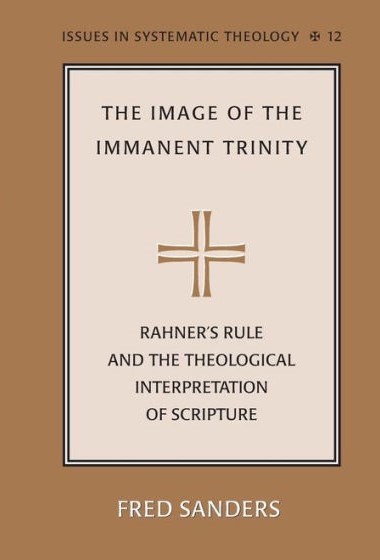A scene from the Leben der heiligen Altväter (1482)
The Image of the Immanent Trinity
Rahner's Rule and the Theological Interpretation of Scripture
Based on my 2001 dissertation at the Graduate Theological Union, The Image of the Immanent Trinity is written in a more scholarly register than much of my later work. It takes the most important sentence in the modern academic revival of trinitarian theology, “the economic Trinity is the immanent Trinity, and vice versa,” and subjects it to four kinds of analysis: First, it investigates how the sentence emerged from Karl Rahner’s work on historical and systematic theology; second, it surveys how subsequent theologians interpreted the sentence; third, it compares the sentence to the longer history of trinitarian theology; and fourth, it questions the value of the sentence for carrying out a theological interpretation of Scripture.
The dissertation itself was written under advisor Ted Peters, with a committee that included Ralph Del Colle, Bob Russell, and art historian Doug Adams. Catherine Mowry LaCugna had agreed to serve as a reader, but passed away before the project reached completion. In his earlier work, Ted Peters coined the name “Rahner’s Rule” for this key sentence, so including it in the title was a nod of thanks to him. The original dissertation included a chapter on the history of the iconography of the Trinity; for book publication I removed this chapter, replacing it with one on Karl Barth. My editor at Peter Lang was Paul Molnar, who was writing his own influential book on the immanent Trinity at the same time.
If “the economic Trinity is the immanent Trinity,” as Karl Rahner said, then what difference does it make for how we read the Bible? This book takes up the discussion that has dominated the last several decades of Trinitarian theology –that of Rahner’s Rule– and brings it into dialogue with the longer history of the doctrine, particularly with the history of interpretation of scripture. The history of Trinitarianism is the history of complex interpretive moves, a long conversation in which the Christian church has sought to learn how to ask the right questions of scripture. Surveying recent theological projects and learning from their successes and failures, The Image of the Immanent Trinity argues that the eternally perfect fellowship of Father, Son, and Spirit is truly present for our salvation in Christ who, as the image of the invisible God, secures God’s presence in the economy of salvation as the image of the immanent Trinity.
Peter Lang Publishing (2004)
Hardback, 206 pages
ISBN-10 : 0820467103
ISBN-13 : 978-0820467108
Available at any of the following.

“Fred Sanders explores one of the pressing issues in Trinitarian theology today. The renaissance of this core Christian doctrine in systematic theology in recent decades owes much to Karl Rahner’s axiom on the relationship between the immanent Trinity and the economic Trinity (‘the economic Trinity is the immanent Trinity and vice versa’) with emphasis on the centrality of the divine economy for a proper and fruitful theological perspective. Sanders examines the theological responses to the axiom with attention to those who enthusiastically radicalize the axiom and those who cautiously restrict it. The implications for the doctrine of the Trinity are not insignificant. Sanders attempts to resolve the dispute with his own proposal, namely, that the economic Trinity is the image of the immanent Trinity. Sanders’ contribution will be welcomed by all engaged in the discipline. He takes seriously both the endorsements and critiques and provides a solution that does not forget the Christological foundations for Trinitarian theology. In the midst of the continued appropriation of the Trinity across the theological spectrum, Sanders’ voice will be an important one if our thinking the triune God is to be given its full measure of theological depth and seriousness.”

“The sublime mysteries of the Holy Trinity become understandable through the prose of Fred Sanders. To say ‘the economic Trinity is the immanent Trinity’ is to say forcefully that the Holy One abides with us. This book communicates this message beautifully.”
 Fred Sanders
Fred Sanders





